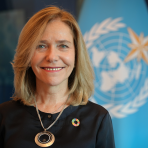Opening Remarks at the Investor Forum 2025
Excellencies, distinguished guests, partners and friends,
One of the most common questions on the planet is simple: What’s the weather going to be?
Behind that simple question lies one of the most complex and extraordinary systems of collaboration ever created — the global infrastructure that WMO coordinates.
Every forecast, every climate model, every flood or drought warning depends on that invisible architecture: the standards, observations, and data exchange that make the world’s weather, climate and water intelligence possible.
Most people never see it — but everyone, everywhere, depends on it.
That is why we are here today: to make the invisible visible, and to invest in what truly sustains resilience, stability, and growth — the global public backbone that keeps societies and markets functioning in a volatile climate.
For 75 years, WMO has united governments and scientists to share the world’s most valuable common resource: trustworthy information. Because weather has no passport, climate knows no borders, and water connects us all. So, you may ask: If this work is so essential, how is it that we have not made its value more widely known?
The truth is that WMO’s success has been its own best disguise.
We were built to serve quietly — to deliver results, not headlines. The systems we coordinate were designed for reliability, not visibility.
For decades, the world experienced the benefits of this collaboration without realizing that it depended on a global network of trust, science and shared responsibility.
In a way, that invisibility was a mark of success — until now.
Because today, that success is at risk.
The backbone that holds this system together is under strain — financially, technically, and institutionally.
Data gaps are widening where the needs are greatest.
Critical infrastructure in developing regions is aging or underfunded.
And the cost of inaction is mounting — measured not only in economic losses but in the erosion of trust, predictability, and collective security.
There is also a quieter risk: the erosion of multilateral cooperation.
The same spirit of trust that once made global data sharing possible is now strained by polarization and the growing tendency to treat meteorological information as a national or commercial asset.
In some regions, data exchanges have already become conditional, and essential observation networks depend on temporary arrangements.
Every disruption in that chain weakens the accuracy of global forecasts — and with it, our shared capacity to anticipate risk.
The paradox is striking.
Everyone talks about climate. Everyone needs the data. Every market depends on it.
Yet when it comes to sustaining the system that makes it all possible, funding remains scarce.
The challenge is not visibility alone — it is value recognition.
What WMO provides cannot be owned, branded, or fenced off. It is the foundation on which others build — a shared infrastructure that fuels entire markets and saves lives every day.
Like all common goods, it thrives only when its benefits are matched by shared responsibility.
That is why partnership and investment matter: to ensure this global system remains open, reliable, and strong enough to serve everyone.
That leads to another question I hear often: Are we simply bad at marketing?
Partly, yes — we have not always told our story in ways that resonate outside the scientific or policy community.
But this is not just about marketing.
It is about translating scientific necessity into economic logic — about making it clear that what we offer is not a cost, but a strategic investment in resilience and stability.
Marketing can open the door, but what sustains it is understanding: that every forecast, every risk model, every resilience plan depends on the open, interoperable system that WMO holds together.
This cooperation underpins trillions of dollars in global economic activity — from aviation and shipping to agriculture, insurance, and finance. Still, paradoxically, the system that enables this value is itself fragile and underfunded.
Today, climate extremes are accelerating faster than our capacity to manage them.
In 2024 alone, global weather-related losses reached 318 billion dollars — half of it uninsured. But with every dollar invested in early warnings and climate intelligence, we save up to fifteen.
The logic is simple: resilience pays.
WMO’s mission is not charity — it is risk management at planetary scale. It is the foundation upon which sustainable finance, resilient supply chains, and stable societies depend.
That is why, tomorrow, we will introduce a bold new partnership: the WMO Weather, Climate and Water Intelligence Commons — a collective financing mechanism to safeguard and strengthen the backbone of global climate intelligence.
The WMO Commons is not a fund in the traditional sense. It is an investment in continuity and confidence — pooling public, philanthropic, and private resources to ensure that data flows freely, systems remain interoperable, and innovation reaches those who need it most.
It aligns with the Paris Agreement, the Sustainable Development Goals, and the Early Warnings for All initiative — but it also aligns with the interests of every investor who depends on predictable markets and informed decisions.
Your engagement — as partners, investors, and champions — can ensure that this global public infrastructure remains fit for purpose. Together, we can turn climate risk into opportunity — not by chance, but by design — by investing in knowledge, trust, and the systems that keep the world prepared.
The world needs WMO. But more importantly, the world needs all of us to act — together.
Thank you.
Statement by


